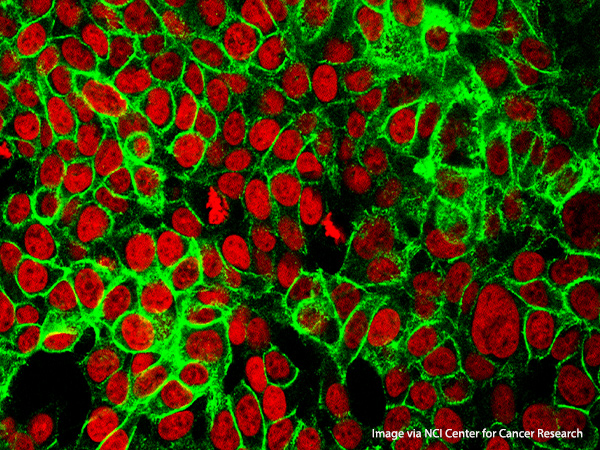A First-line Immunotherapy for Certain Colon Cancers
The FDA approved the use of an immune checkpoint inhibitor as a first-line treatment for patients with colorectal cancers caused by genetic mutations that stem from an inability to repair mistakes or damage in DNA coding.

The U.S. Food and Drug Administration (FDA) has approved pembrolizumab (Keytruda) as a first-line treatment for patients with unresectable or metastatic microsatellite instability-high (MSI-H) or mismatch repair deficient (dMMR) colorectal cancer. About 15 percent of colorectal cancers fall into the microsatellite instability-high or mismatch repair deficient categories.
Patients with these forms of the disease have genetic markers that indicate problems with the body’s system for recognizing errors during DNA replication or for repairing damaged DNA. Pembrolizumab inhibits a checkpoint protein called PD-1 that is present on some immune cells called T cells. Cancer cells sometimes hijack the PD-1 cellular pathway to evade T cells, which are designed to detect and destroy them. Pembrolizumab takes the brakes off the T cells so they can be activated to fight the cancer.
The FDA based its approval on a multicenter, international, open-label, active-controlled, randomized trial involving 307 patients with previously untreated unresectable or metastatic MSI-H or dMMR colorectal cancer. Participants were randomized to either receive the checkpoint inhibitor or chemotherapy. The median progression-free survival for those who received pembrolizumab was 16.5 months, compared with 8.2 months for patients in the chemotherapy arm of the study.
Colorectal cancer is the second most common cause of cancer death in the United states, according to National Cancer Institute statistics. In 2020, close to 148,000 new cases of colon cancer are expected to be diagnosed.
The FDA approval was rendered on June 29, 2020.
